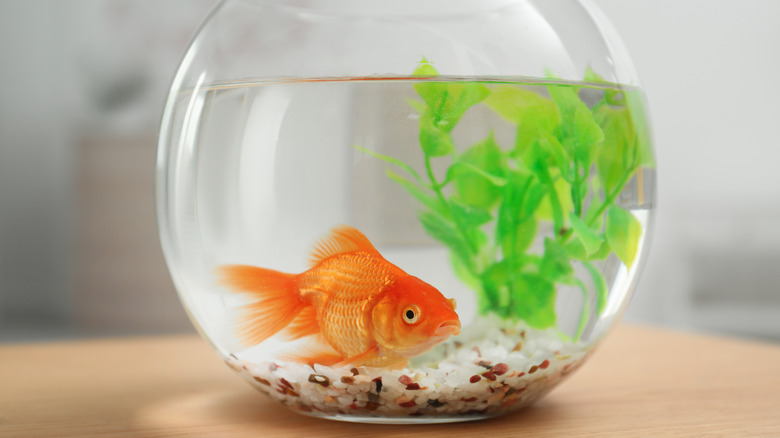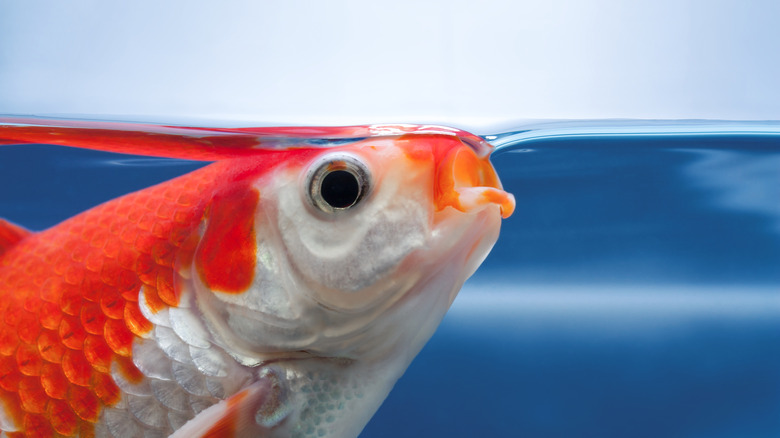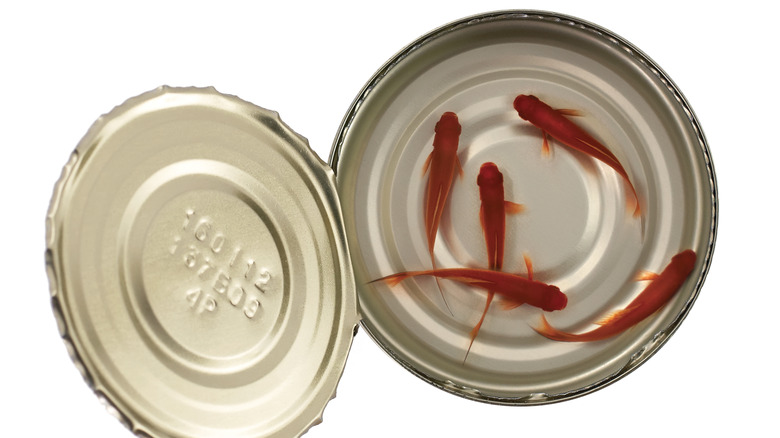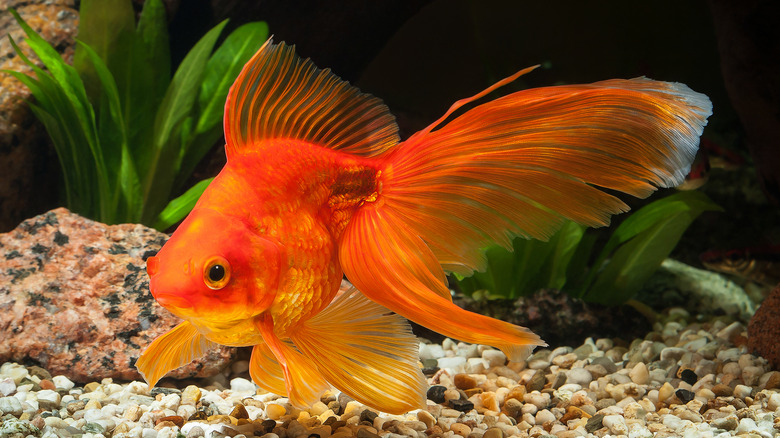You Can Eat Your Goldfish, But Here's Why You Shouldn't
It's true, you really can eat goldfish. They are just smaller versions of carp, a freshwater fish that has been consumed for centuries. Unlike wild carp though, today's domesticated goldfish (Carassius auratus), are bred to be sold as either ornamental pets, as feeder fish, or as bait. While goldfish are technically edible in that they are not poisonous, whether they are palatable or even safe to eat is an entirely different story. There's also the fact that many people grow attached to these creatures as pets and don't think of them as a source of food.
Carp is not usually thought of as a particularly tasty fish. The way they taste is affected by what they eat, and the waters they live in. These fish are bottom feeders, and since they live in murky waters, they are often described as tasting like mud. The same applies to goldfish, either wild caught or from a fish farm. Unlike the larger carp, however, smaller pet-sized goldfish (they can actually grow much bigger in the wild) have very little meat but a lot of inedible bones, and deboning them is rather difficult.
More importantly, goldfish carry zoonotic diseases, which means diseases that can be passed from animals to humans and cause illness. This can range from food poisoning, to parasites, and more serious bacterial infections. Whether the fish are living or dead, raw or cooked, they can still transmit disease as some bacteria are resistant to the heat of cooking.
Eating goldfish could make you sick
There are a number of different illnesses you may be exposed to by eating or even just handling goldfish. Among the most dangerous are conditions caused by bacterial infections, including salmonella, campylobacter, and tuberculosis (per IACUC). Infection can occur through small cuts on your hands, or by either ingesting the fish or the water they live in.
Food poisoning symptoms caused by salmonella and campylobacter can include fever, diarrhea, stomach cramps, vomiting, and in extreme cases, death. Goldfish may also have fish tuberculosis caused by mycobacteria. This zoonotic condition can infect you with what's known as fish tank granulomas which cause skin rashes and lesions. Worse, it can also develop into the human form of tuberculosis. TB's symptoms can include coughing up blood, chest pain, fatigue, fever, and night sweats, among other unpleasant ailments, and if left untreated can also be fatal (per WHO).
Eating goldfish can also lead to intestinal diseases caused by a host of parasites. These can include fish lice, flukes, and more worms than you really want to think about, such as tapeworms, anchorworms, and nematodes ... the latter being the reason why Anthony Bourdain stopped eating swordfish.
Goldfish taste just like their environment
Since goldfish take on the essence of what they eat and their environment, that could mean they taste like a stinky fish tank or a polluted river. Pet goldfish are usually fed processed fish flakes or pellets, and if you've ever smelled the stuff, you know it doesn't exactly appear appetizing. Fish food ingredients can include fish and squid meal, fish eggs, worms, algae, even antibiotics, and other additives. Yuck.
In a YouTube video titled "Seth Morris and Spencer Neuharth Eat Goldfish," the content creators see for themselves what the tiny creatures really taste like. The two men do their best to debone the fish but find it almost impossible. From the start, they are overwhelmed by the unpleasant fishy smell. They opt to cook it by seasoning it with salt, pepper, and garlic powder, then dredging in flour before deep frying the fish.
Despite their best efforts to make the goldfish taste good, they found it to be pretty revolting, with one of them actually spitting it out, unable to bring himself to swallow a bite. The video partner described the flavor as having a "muddy, fishy, kind of gross taste," and then sucked on a lemon wedge just to get the goldfish taste out of his mouth. They concluded that goldfish have too many bones, not enough meat, and a strong, foul, fishy taste. To sum up the experience, one of them states, "That might be one of the worst things we've eaten."
Why would anyone want to eat a goldfish?
From the bizarrely popular 1930s fad of live goldfish gulping, to modern day stunts like Steve-O from "Jackass" swallowing one on camera, people have apparently been curious about eating goldfish for quite some time. Which begs the question ... why?
One legitimate reason is their availability. The practice of eating goldfish is picking up in parts of the United States where the fish have become invasive. In the Great Lakes region, goldfish are a significant part of the fishing industry's catch, where fishermen bring in hundreds of thousands of pounds from Lake Erie alone. The fish are sold as "gold carp," perhaps in an attempt to normalize eating them. Subsistence fishing may be another reason someone would consider eating goldfish, however, as a food source for people, goldfish don't have much nutritional value.
This leaves the ethical quandary of eating goldfish. Whether you're a vegetarian who abstains from eating fish, or a foodie who just cannot get enough seafood, it's hard to argue with the stance that eating animals bred as pets is both unsanitary and unnecessary. If you've still got a hankering for raw fish, try a next-level piece of sushi instead. Even given the food safety concerns and the fact that they taste bad, you could eat goldfish, but you really shouldn't. With all the far more delicious varieties of fish available to dine on, goldfish belong in their tanks and ponds — not on your plate.




